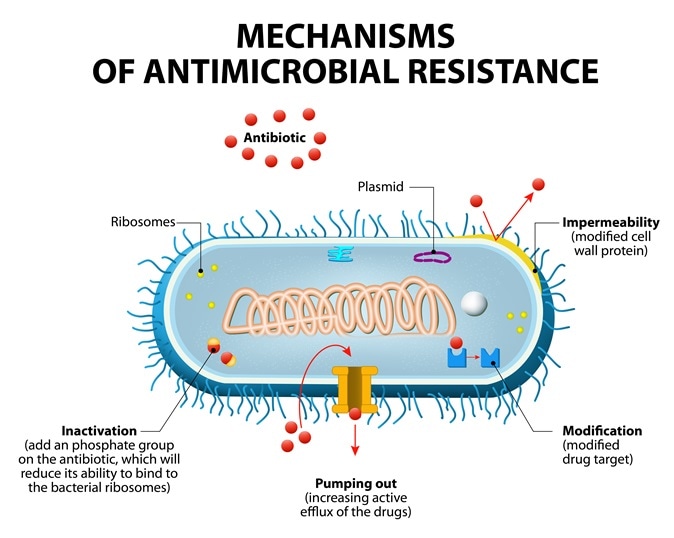Antibiotic resistance is one of the hottest concerns worldwide today and is likely to take back the human civilization to the pre-antibiotic era at this rate. A new report titled “Stemming the Superbug Tide”, has speculated that antibiotic resistant bugs are soon likely to kill over 90,000 Britons over the next three decades if it is not curbed now.

Main mechanisms by which microorganisms exhibit resistance to antimicrobials. Image Credit: Designua / Shutterstock
The Organisation for Economic Co-operation and Development (OECD) report suggests that antibiotic resistance is likely to kill 2.4 million people across Europe, Australia and North America by 2050 if it is not halted now. Of these 1.3 million are likely to occur in Europe and 90,000 are predicted in Britain says the report. Antibiotic resistance is described as “one of the biggest threats to modern medicine” in this latest report. At present there are 44,000 deaths annually in UK due to sepsis caused by antibiotic resistant strains of bacteria. Around 17 percent of all infections in the OECD nations are due to antibiotic resistance says the report.
The report advises that there are simple measures to be adopted to reduce and slow down the progression of antibiotic resistance. This includes hand washing routines, better hygiene and sanitation among health care workers. The report recommends conservative prescription of antibiotics. They suggest that all infections need to be tested rapidly for the antibiotics they are sensitive to. This can prevent the emergence of new superbugs and also allow for better cure of the infection in the first place. Empirical antibiotic therapy needs to be stopped the experts suggest. The report suggests that antibiotics could be withheld for the first three days by which time viral infections tend to subside. This would also prevent unnecessary antibiotic prescriptions. The report advises widespread public health awareness campaigns to help people adopt safe antibiotic use policies.
The report warns that there is a faster emergence of antibiotic resistant strains of microbes in the low- and middle-income countries compared to developed nations. Many strains have already developed resistance to the first line antibiotics against them. The report adds that over the next couple of decades the strains of the bacteria would develop resistance to the second and third line reserved antibiotics as well making their infections difficult to treat. The warnings are pertinent for southern European countries such as Italy, Greece and Portugal which are the top nations at risk among the OECD countries.
This report is one of the results of a campaign in England against patients asking for medications when not required. According to the Public Health England (PHE), antibiotics that are active against serious infections are routinely being prescribed for minor infections such as those of the throat, ear etc. which often improve even without treatment. The campaign’s main slogan was “antibiotics aren’t always needed”.
Experts have suggested that putting in efforts to curb antibiotic resistance would pay off in the long run and this report proves that. Tim Jinks, head of the Wellcome Trust’s drug-resistant infections priority programme for example explained that antibiotic resistance is a threat to “global health and development”. The OECD report states that rise of antibiotic resistance can raise healthcare costs to a great extent and stopping it now would bring down healthcare costs to just $2 (£1.50) per person annually. Further three in four deaths could be avoided if measures are taken now says the report.